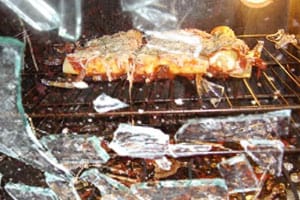
For foodies and in most American homes, for that matter, a piece of Pyrex glassware is almost a given and has been for generations. And as many people unwrap new kitchen glassware this season or turn to more of it in preparing big dinners, one consumer advocacy group is warning consumers about the dangers of […]
 For foodies and in most American homes, for that matter, a piece of Pyrex glassware is almost a given and has been for generations.
For foodies and in most American homes, for that matter, a piece of Pyrex glassware is almost a given and has been for generations.
And as many people unwrap new kitchen glassware this season or turn to more of it in preparing big dinners, one consumer advocacy group is warning consumers about the dangers of Pyrex and other popular kitchen glassware, namely the risk of them exploding unexpectedly. According to the site ConsumerAffairs.com, there have been 1,600 reports since 1998 in which Pyrex or other glass baking dishes and kitchenware had exploded or shattered suddenly. This can lead to serious injuries if shards of glass are sent airborne in no particular direction.
For its recent report, ConsumerAffairs.com reported on both Pyrex and Anchor Hocking glassware. The site estimates that each company produces a combine 74 million pieces of glass kitchen bakeware and measuring dishes each year. Further, glass bakeware is found in at least 80 percent of all American homes.
In a recent Today show report, NBC News reports of one family’s horror when a glass Pyrex casserole dish was placed at the center of their dinner table, the family gathered around ready to eat, when it suddenly popped and glass was sent flying. No one was injured in the incident but it magnifies the potential dangers posed by these popular household staples.
The report does tell of one Houston man’s ordeal with an exploding Pyrex measuring cup, an incident which sent glass flying at his arm. The gash caused by the flying piece of glass required him to get stitches for his injury but he should consider himself lucky to escape more serious injury.
Lately, there has been a sharp rise in the number of incidents in which Pyrex and other glass baking dishes have exploded. According to the Today show report from NBC, the Consumer Product Safety Commission has received 576 reports in the last 13 years in which Pyrex and other glass dishes have exploded. As of mid-November, the agency had already received 93 reports in 2012. Last year, the most annual incidents were reported, 144.
The rise in the number of incidents has consumers and at least one team of researchers wondering if they’re either not using these glass pieces properly or if something is different with them. Researchers at University of Alabama-Tuscaloosa recently released a study which found older Pyrex dishes to be less prone to explosions and sudden cracking than newer versions of them.
World Kitchen, the makers of Pyrex, refuted the claims in that study and even sued claiming trade disparagement, in response. The rise in reports, they say, is due to volume of products and improper use. The company also reiterated its safety warnings that are included with the products to prevent them from shattering unexpectedly:


